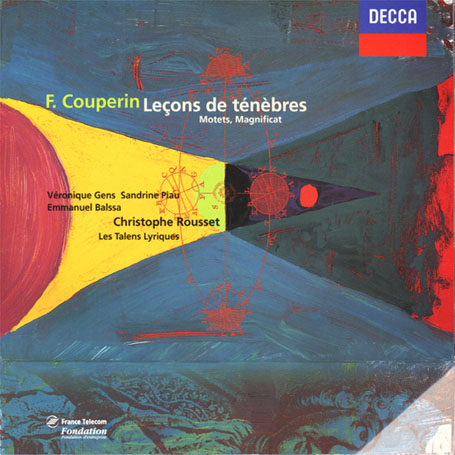Couperin Leçons de ténebre
Powerful, solemnly beautiful music performed by a group of France's finest baroque musicians
View record and artist detailsRecord and Artist Details
Composer or Director: François Couperin
Label: Decca
Magazine Review Date: 4/2000
Media Format: CD or Download
Media Runtime: 65
Mastering:
DDD
Catalogue Number: 466 776-2OH

Tracks:
| Composition | Artist Credit |
|---|---|
| (3) Leçons de ténèbres |
François Couperin, Composer
(Les) Talens Lyriques Christoph Rousset, Organ Emmanuel Balsa, Viola da gamba François Couperin, Composer Sandrine Piau, Soprano Véronique Gens, Soprano |
| Laetentur coeli et exultet |
François Couperin, Composer
(Les) Talens Lyriques Christoph Rousset, Organ Emmanuel Balsa, Viola da gamba François Couperin, Composer Sandrine Piau, Soprano Véronique Gens, Soprano |
| Magnificat anima mea |
François Couperin, Composer
(Les) Talens Lyriques Christoph Rousset, Organ François Couperin, Composer Sandrine Piau, Soprano Véronique Gens, Soprano |
| Victoria! Christo resurgenti |
François Couperin, Composer
(Les) Talens Lyriques Christoph Rousset, Organ François Couperin, Composer Sandrine Piau, Soprano Véronique Gens, Soprano |
Author: Lindsay Kemp
Couperin's superb settings for solo voices and continuo of the sombre Tenebrae lessons for the Wednesday of Holy Week, composed around 1715, have seen a steady trickle of recordings over the years, without there ever seeming to be much danger of a flood. Yet, with their exquisitely drawn melodies and anguished but dignified chromaticisms, they will come as a surprise to listeners used to seeing Couperin only as an urbane, perhaps even rather frivolous court harpsichord composer. Indeed, in their sheer power and beauty the Lecons de tenebres unquestionably rate among the highest musical achievements of the baroque period.
This new recording comes with an impressive pedigree, featuring as it does two of France's leading baroque sopranos. Both sing with a refined vocal intensity learned in the baroque stage repertoire, bringing a declamatory flavour to the Lecons' recitatives, heart-rending laments and occasional apocalyptic outbursts, while demonstrating in the more free-flowing music (in particular the vocalise-like settings of the Hebrew letters which head each section of text) consummate control and poise. Sandrine Piau's voice is the lighter and purer of the two; that of Veronique Gens is darker, heavier and has a touch more vibrato, yet when the two of them come together in the Third Lecon they blend surprisingly well. The gamba-and-organ accompaniments are tasteful and unobtrusive (typically so for the serious-minded Christophe Rousset), by comparison with which William Christie's harpsichord accompaniments on Erato are more interventionist and less earnest, their greater range of textural options helping to push Les Arts Florissants sopranos Patricia Petibon and Sophie Daneman (who also finds a surprisingly sensual element in the music) into readings which are more sprightly and text-aware.
In truth, this is the kind of music which allows for countless fascinating comparisons of detail, and while those coming to it for the first time will be excellently served by the new recording, owners of existing accounts will not find it a waste of their money, either. The Decca release, furthermore, is considerably more generous than the Erato, filled out to respectable length in joyous vein by two additional two-voice motets (for Easter and St Bartholomew's days respectively) and a substantial Magnificat.'
This new recording comes with an impressive pedigree, featuring as it does two of France's leading baroque sopranos. Both sing with a refined vocal intensity learned in the baroque stage repertoire, bringing a declamatory flavour to the Lecons' recitatives, heart-rending laments and occasional apocalyptic outbursts, while demonstrating in the more free-flowing music (in particular the vocalise-like settings of the Hebrew letters which head each section of text) consummate control and poise. Sandrine Piau's voice is the lighter and purer of the two; that of Veronique Gens is darker, heavier and has a touch more vibrato, yet when the two of them come together in the Third Lecon they blend surprisingly well. The gamba-and-organ accompaniments are tasteful and unobtrusive (typically so for the serious-minded Christophe Rousset), by comparison with which William Christie's harpsichord accompaniments on Erato are more interventionist and less earnest, their greater range of textural options helping to push Les Arts Florissants sopranos Patricia Petibon and Sophie Daneman (who also finds a surprisingly sensual element in the music) into readings which are more sprightly and text-aware.
In truth, this is the kind of music which allows for countless fascinating comparisons of detail, and while those coming to it for the first time will be excellently served by the new recording, owners of existing accounts will not find it a waste of their money, either. The Decca release, furthermore, is considerably more generous than the Erato, filled out to respectable length in joyous vein by two additional two-voice motets (for Easter and St Bartholomew's days respectively) and a substantial Magnificat.'
Discover the world's largest classical music catalogue with Presto Music.

Gramophone Digital Club
- Digital Edition
- Digital Archive
- Reviews Database
- Full website access
From £8.75 / month
Subscribe
Gramophone Full Club
- Print Edition
- Digital Edition
- Digital Archive
- Reviews Database
- Full website access
From £11.00 / month
Subscribe
If you are a library, university or other organisation that would be interested in an institutional subscription to Gramophone please click here for further information.




